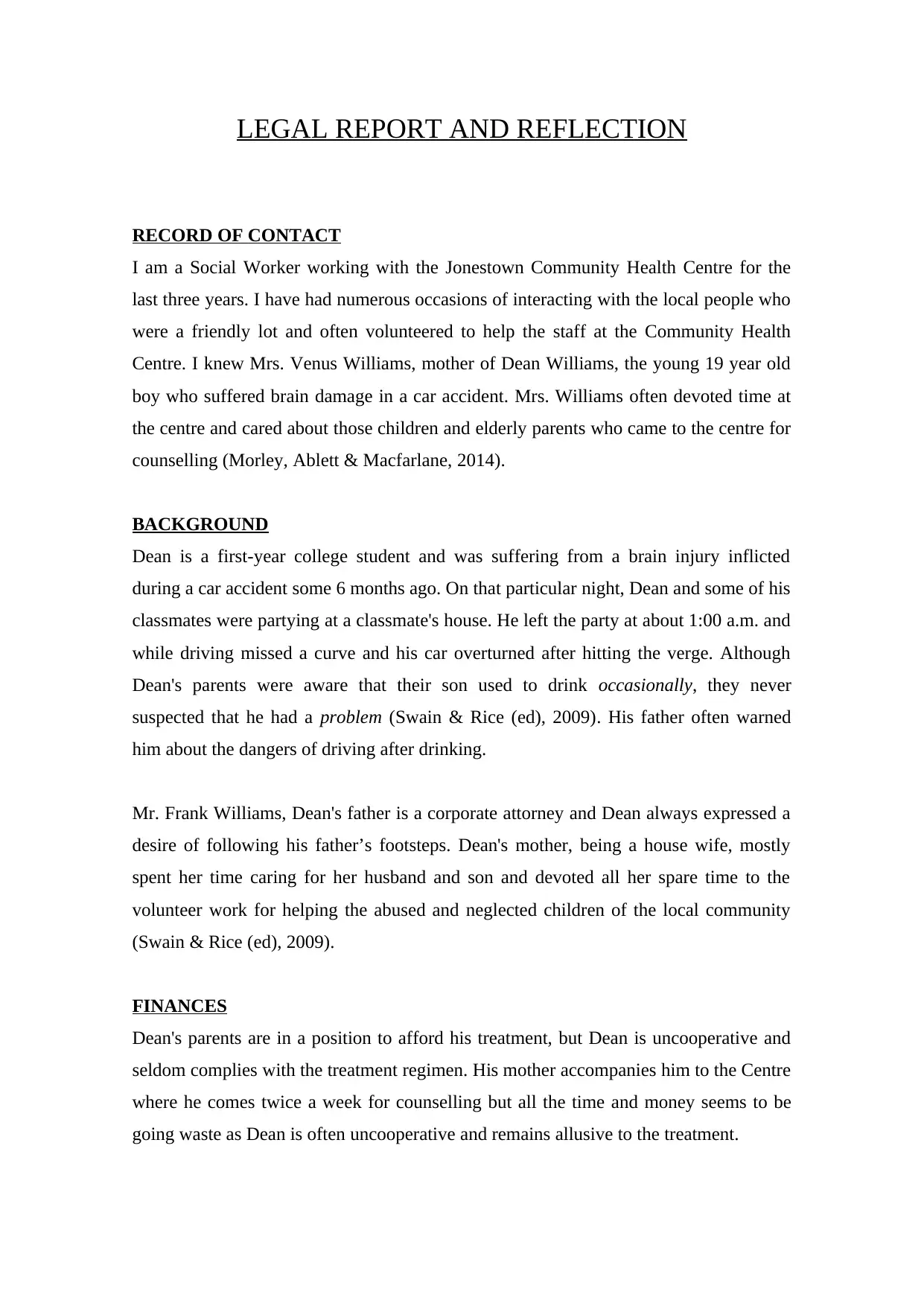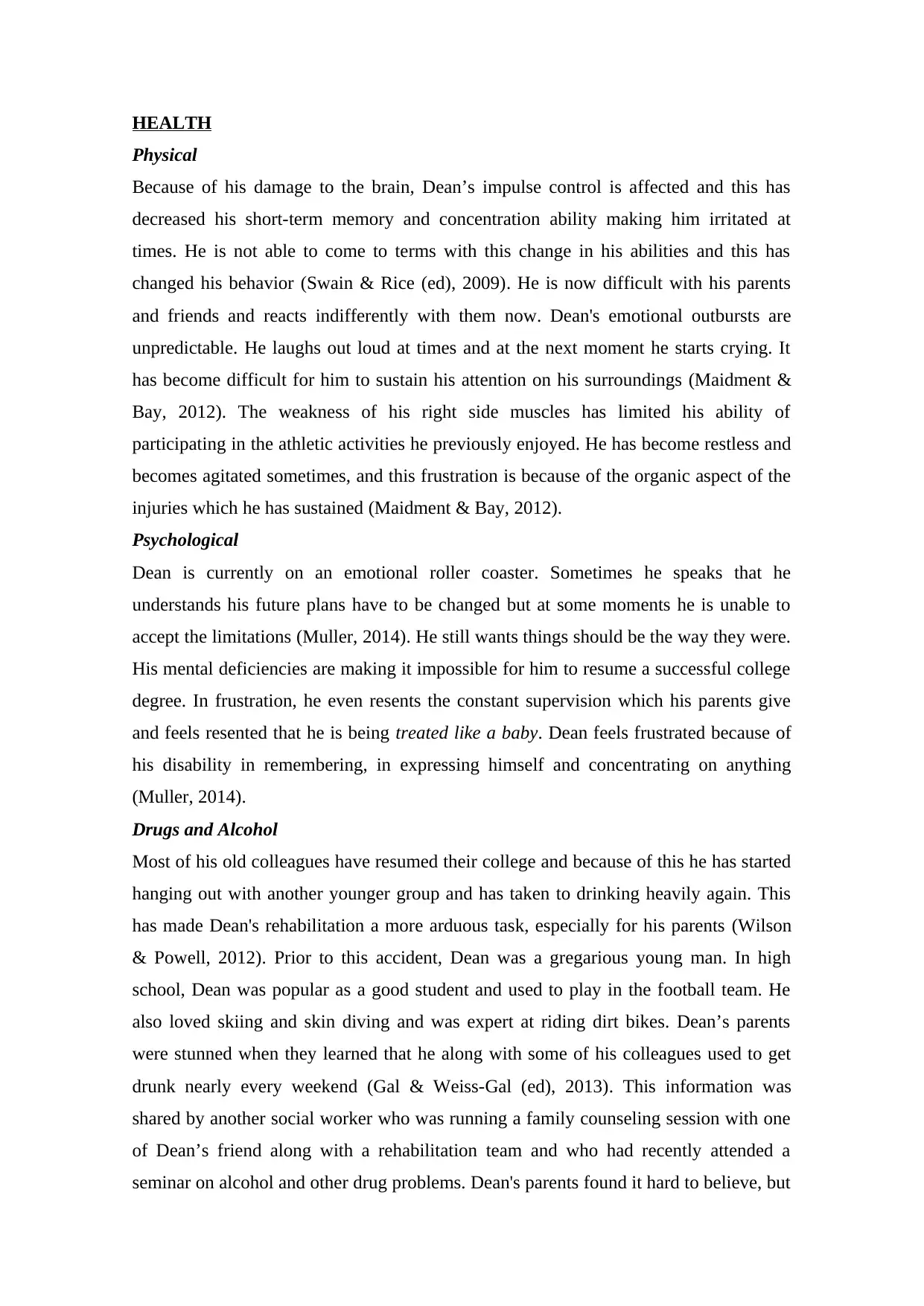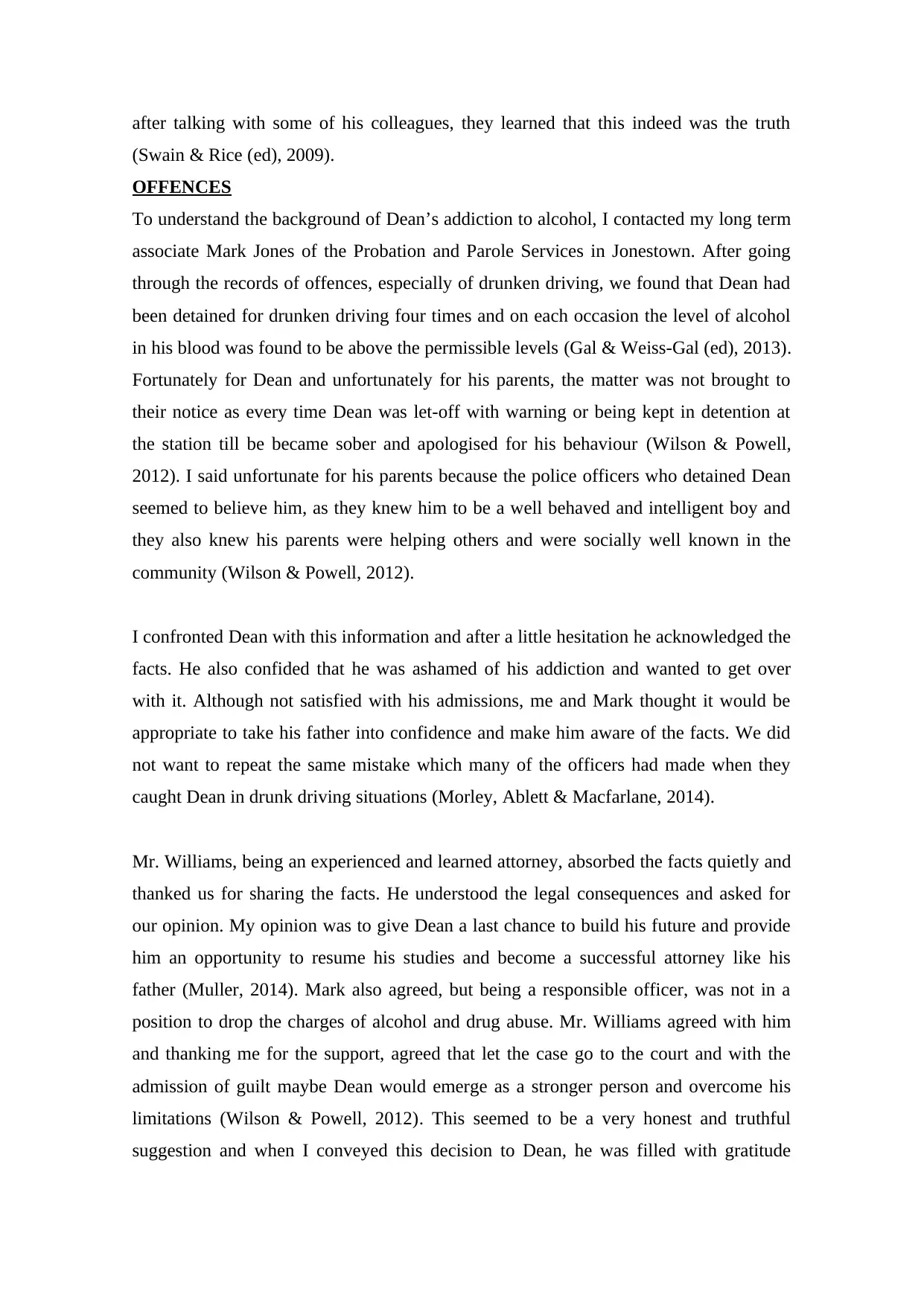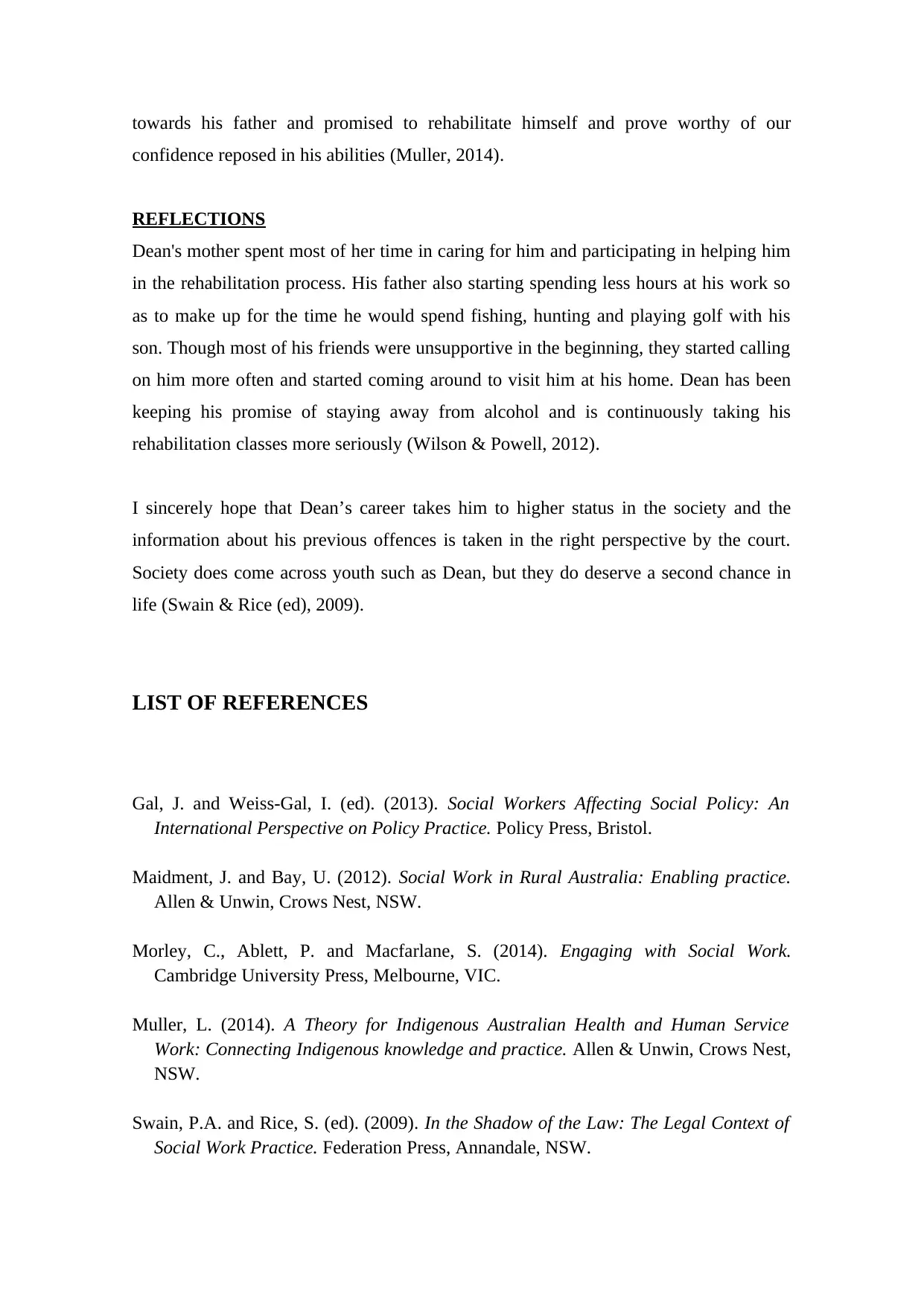Legal Report and Reflection Record of Contact: Social Work Case
VerifiedAdded on 2021/04/24
|5
|1719
|35
Report
AI Summary
This legal report and reflection record details a social worker's involvement with Dean Williams, a 19-year-old college student who suffered a brain injury in a car accident and struggles with alcohol abuse. The report outlines Dean's background, financial situation, physical and psychological health challenges, and history of alcohol-related offenses, including multiple instances of drunken driving. The social worker collaborates with a probation officer and Dean's father, a corporate attorney, to address the legal and personal ramifications of Dean's actions. The report reflects on the interventions, Dean's progress in rehabilitation, and the importance of offering second chances to young people. References to legal frameworks and social work practices are included, providing a comprehensive analysis of the case.

LEGAL REPORT AND REFLECTION
RECORD OF CONTACT
I am a Social Worker working with the Jonestown Community Health Centre for the
last three years. I have had numerous occasions of interacting with the local people who
were a friendly lot and often volunteered to help the staff at the Community Health
Centre. I knew Mrs. Venus Williams, mother of Dean Williams, the young 19 year old
boy who suffered brain damage in a car accident. Mrs. Williams often devoted time at
the centre and cared about those children and elderly parents who came to the centre for
counselling (Morley, Ablett & Macfarlane, 2014).
BACKGROUND
Dean is a first-year college student and was suffering from a brain injury inflicted
during a car accident some 6 months ago. On that particular night, Dean and some of his
classmates were partying at a classmate's house. He left the party at about 1:00 a.m. and
while driving missed a curve and his car overturned after hitting the verge. Although
Dean's parents were aware that their son used to drink occasionally, they never
suspected that he had a problem (Swain & Rice (ed), 2009). His father often warned
him about the dangers of driving after drinking.
Mr. Frank Williams, Dean's father is a corporate attorney and Dean always expressed a
desire of following his father’s footsteps. Dean's mother, being a house wife, mostly
spent her time caring for her husband and son and devoted all her spare time to the
volunteer work for helping the abused and neglected children of the local community
(Swain & Rice (ed), 2009).
FINANCES
Dean's parents are in a position to afford his treatment, but Dean is uncooperative and
seldom complies with the treatment regimen. His mother accompanies him to the Centre
where he comes twice a week for counselling but all the time and money seems to be
going waste as Dean is often uncooperative and remains allusive to the treatment.
RECORD OF CONTACT
I am a Social Worker working with the Jonestown Community Health Centre for the
last three years. I have had numerous occasions of interacting with the local people who
were a friendly lot and often volunteered to help the staff at the Community Health
Centre. I knew Mrs. Venus Williams, mother of Dean Williams, the young 19 year old
boy who suffered brain damage in a car accident. Mrs. Williams often devoted time at
the centre and cared about those children and elderly parents who came to the centre for
counselling (Morley, Ablett & Macfarlane, 2014).
BACKGROUND
Dean is a first-year college student and was suffering from a brain injury inflicted
during a car accident some 6 months ago. On that particular night, Dean and some of his
classmates were partying at a classmate's house. He left the party at about 1:00 a.m. and
while driving missed a curve and his car overturned after hitting the verge. Although
Dean's parents were aware that their son used to drink occasionally, they never
suspected that he had a problem (Swain & Rice (ed), 2009). His father often warned
him about the dangers of driving after drinking.
Mr. Frank Williams, Dean's father is a corporate attorney and Dean always expressed a
desire of following his father’s footsteps. Dean's mother, being a house wife, mostly
spent her time caring for her husband and son and devoted all her spare time to the
volunteer work for helping the abused and neglected children of the local community
(Swain & Rice (ed), 2009).
FINANCES
Dean's parents are in a position to afford his treatment, but Dean is uncooperative and
seldom complies with the treatment regimen. His mother accompanies him to the Centre
where he comes twice a week for counselling but all the time and money seems to be
going waste as Dean is often uncooperative and remains allusive to the treatment.
Paraphrase This Document
Need a fresh take? Get an instant paraphrase of this document with our AI Paraphraser

HEALTH
Physical
Because of his damage to the brain, Dean’s impulse control is affected and this has
decreased his short-term memory and concentration ability making him irritated at
times. He is not able to come to terms with this change in his abilities and this has
changed his behavior (Swain & Rice (ed), 2009). He is now difficult with his parents
and friends and reacts indifferently with them now. Dean's emotional outbursts are
unpredictable. He laughs out loud at times and at the next moment he starts crying. It
has become difficult for him to sustain his attention on his surroundings (Maidment &
Bay, 2012). The weakness of his right side muscles has limited his ability of
participating in the athletic activities he previously enjoyed. He has become restless and
becomes agitated sometimes, and this frustration is because of the organic aspect of the
injuries which he has sustained (Maidment & Bay, 2012).
Psychological
Dean is currently on an emotional roller coaster. Sometimes he speaks that he
understands his future plans have to be changed but at some moments he is unable to
accept the limitations (Muller, 2014). He still wants things should be the way they were.
His mental deficiencies are making it impossible for him to resume a successful college
degree. In frustration, he even resents the constant supervision which his parents give
and feels resented that he is being treated like a baby. Dean feels frustrated because of
his disability in remembering, in expressing himself and concentrating on anything
(Muller, 2014).
Drugs and Alcohol
Most of his old colleagues have resumed their college and because of this he has started
hanging out with another younger group and has taken to drinking heavily again. This
has made Dean's rehabilitation a more arduous task, especially for his parents (Wilson
& Powell, 2012). Prior to this accident, Dean was a gregarious young man. In high
school, Dean was popular as a good student and used to play in the football team. He
also loved skiing and skin diving and was expert at riding dirt bikes. Dean’s parents
were stunned when they learned that he along with some of his colleagues used to get
drunk nearly every weekend (Gal & Weiss-Gal (ed), 2013). This information was
shared by another social worker who was running a family counseling session with one
of Dean’s friend along with a rehabilitation team and who had recently attended a
seminar on alcohol and other drug problems. Dean's parents found it hard to believe, but
Physical
Because of his damage to the brain, Dean’s impulse control is affected and this has
decreased his short-term memory and concentration ability making him irritated at
times. He is not able to come to terms with this change in his abilities and this has
changed his behavior (Swain & Rice (ed), 2009). He is now difficult with his parents
and friends and reacts indifferently with them now. Dean's emotional outbursts are
unpredictable. He laughs out loud at times and at the next moment he starts crying. It
has become difficult for him to sustain his attention on his surroundings (Maidment &
Bay, 2012). The weakness of his right side muscles has limited his ability of
participating in the athletic activities he previously enjoyed. He has become restless and
becomes agitated sometimes, and this frustration is because of the organic aspect of the
injuries which he has sustained (Maidment & Bay, 2012).
Psychological
Dean is currently on an emotional roller coaster. Sometimes he speaks that he
understands his future plans have to be changed but at some moments he is unable to
accept the limitations (Muller, 2014). He still wants things should be the way they were.
His mental deficiencies are making it impossible for him to resume a successful college
degree. In frustration, he even resents the constant supervision which his parents give
and feels resented that he is being treated like a baby. Dean feels frustrated because of
his disability in remembering, in expressing himself and concentrating on anything
(Muller, 2014).
Drugs and Alcohol
Most of his old colleagues have resumed their college and because of this he has started
hanging out with another younger group and has taken to drinking heavily again. This
has made Dean's rehabilitation a more arduous task, especially for his parents (Wilson
& Powell, 2012). Prior to this accident, Dean was a gregarious young man. In high
school, Dean was popular as a good student and used to play in the football team. He
also loved skiing and skin diving and was expert at riding dirt bikes. Dean’s parents
were stunned when they learned that he along with some of his colleagues used to get
drunk nearly every weekend (Gal & Weiss-Gal (ed), 2013). This information was
shared by another social worker who was running a family counseling session with one
of Dean’s friend along with a rehabilitation team and who had recently attended a
seminar on alcohol and other drug problems. Dean's parents found it hard to believe, but

after talking with some of his colleagues, they learned that this indeed was the truth
(Swain & Rice (ed), 2009).
OFFENCES
To understand the background of Dean’s addiction to alcohol, I contacted my long term
associate Mark Jones of the Probation and Parole Services in Jonestown. After going
through the records of offences, especially of drunken driving, we found that Dean had
been detained for drunken driving four times and on each occasion the level of alcohol
in his blood was found to be above the permissible levels (Gal & Weiss-Gal (ed), 2013).
Fortunately for Dean and unfortunately for his parents, the matter was not brought to
their notice as every time Dean was let-off with warning or being kept in detention at
the station till be became sober and apologised for his behaviour (Wilson & Powell,
2012). I said unfortunate for his parents because the police officers who detained Dean
seemed to believe him, as they knew him to be a well behaved and intelligent boy and
they also knew his parents were helping others and were socially well known in the
community (Wilson & Powell, 2012).
I confronted Dean with this information and after a little hesitation he acknowledged the
facts. He also confided that he was ashamed of his addiction and wanted to get over
with it. Although not satisfied with his admissions, me and Mark thought it would be
appropriate to take his father into confidence and make him aware of the facts. We did
not want to repeat the same mistake which many of the officers had made when they
caught Dean in drunk driving situations (Morley, Ablett & Macfarlane, 2014).
Mr. Williams, being an experienced and learned attorney, absorbed the facts quietly and
thanked us for sharing the facts. He understood the legal consequences and asked for
our opinion. My opinion was to give Dean a last chance to build his future and provide
him an opportunity to resume his studies and become a successful attorney like his
father (Muller, 2014). Mark also agreed, but being a responsible officer, was not in a
position to drop the charges of alcohol and drug abuse. Mr. Williams agreed with him
and thanking me for the support, agreed that let the case go to the court and with the
admission of guilt maybe Dean would emerge as a stronger person and overcome his
limitations (Wilson & Powell, 2012). This seemed to be a very honest and truthful
suggestion and when I conveyed this decision to Dean, he was filled with gratitude
(Swain & Rice (ed), 2009).
OFFENCES
To understand the background of Dean’s addiction to alcohol, I contacted my long term
associate Mark Jones of the Probation and Parole Services in Jonestown. After going
through the records of offences, especially of drunken driving, we found that Dean had
been detained for drunken driving four times and on each occasion the level of alcohol
in his blood was found to be above the permissible levels (Gal & Weiss-Gal (ed), 2013).
Fortunately for Dean and unfortunately for his parents, the matter was not brought to
their notice as every time Dean was let-off with warning or being kept in detention at
the station till be became sober and apologised for his behaviour (Wilson & Powell,
2012). I said unfortunate for his parents because the police officers who detained Dean
seemed to believe him, as they knew him to be a well behaved and intelligent boy and
they also knew his parents were helping others and were socially well known in the
community (Wilson & Powell, 2012).
I confronted Dean with this information and after a little hesitation he acknowledged the
facts. He also confided that he was ashamed of his addiction and wanted to get over
with it. Although not satisfied with his admissions, me and Mark thought it would be
appropriate to take his father into confidence and make him aware of the facts. We did
not want to repeat the same mistake which many of the officers had made when they
caught Dean in drunk driving situations (Morley, Ablett & Macfarlane, 2014).
Mr. Williams, being an experienced and learned attorney, absorbed the facts quietly and
thanked us for sharing the facts. He understood the legal consequences and asked for
our opinion. My opinion was to give Dean a last chance to build his future and provide
him an opportunity to resume his studies and become a successful attorney like his
father (Muller, 2014). Mark also agreed, but being a responsible officer, was not in a
position to drop the charges of alcohol and drug abuse. Mr. Williams agreed with him
and thanking me for the support, agreed that let the case go to the court and with the
admission of guilt maybe Dean would emerge as a stronger person and overcome his
limitations (Wilson & Powell, 2012). This seemed to be a very honest and truthful
suggestion and when I conveyed this decision to Dean, he was filled with gratitude
⊘ This is a preview!⊘
Do you want full access?
Subscribe today to unlock all pages.

Trusted by 1+ million students worldwide

towards his father and promised to rehabilitate himself and prove worthy of our
confidence reposed in his abilities (Muller, 2014).
REFLECTIONS
Dean's mother spent most of her time in caring for him and participating in helping him
in the rehabilitation process. His father also starting spending less hours at his work so
as to make up for the time he would spend fishing, hunting and playing golf with his
son. Though most of his friends were unsupportive in the beginning, they started calling
on him more often and started coming around to visit him at his home. Dean has been
keeping his promise of staying away from alcohol and is continuously taking his
rehabilitation classes more seriously (Wilson & Powell, 2012).
I sincerely hope that Dean’s career takes him to higher status in the society and the
information about his previous offences is taken in the right perspective by the court.
Society does come across youth such as Dean, but they do deserve a second chance in
life (Swain & Rice (ed), 2009).
LIST OF REFERENCES
Gal, J. and Weiss-Gal, I. (ed). (2013). Social Workers Affecting Social Policy: An
International Perspective on Policy Practice. Policy Press, Bristol.
Maidment, J. and Bay, U. (2012). Social Work in Rural Australia: Enabling practice.
Allen & Unwin, Crows Nest, NSW.
Morley, C., Ablett, P. and Macfarlane, S. (2014). Engaging with Social Work.
Cambridge University Press, Melbourne, VIC.
Muller, L. (2014). A Theory for Indigenous Australian Health and Human Service
Work: Connecting Indigenous knowledge and practice. Allen & Unwin, Crows Nest,
NSW.
Swain, P.A. and Rice, S. (ed). (2009). In the Shadow of the Law: The Legal Context of
Social Work Practice. Federation Press, Annandale, NSW.
confidence reposed in his abilities (Muller, 2014).
REFLECTIONS
Dean's mother spent most of her time in caring for him and participating in helping him
in the rehabilitation process. His father also starting spending less hours at his work so
as to make up for the time he would spend fishing, hunting and playing golf with his
son. Though most of his friends were unsupportive in the beginning, they started calling
on him more often and started coming around to visit him at his home. Dean has been
keeping his promise of staying away from alcohol and is continuously taking his
rehabilitation classes more seriously (Wilson & Powell, 2012).
I sincerely hope that Dean’s career takes him to higher status in the society and the
information about his previous offences is taken in the right perspective by the court.
Society does come across youth such as Dean, but they do deserve a second chance in
life (Swain & Rice (ed), 2009).
LIST OF REFERENCES
Gal, J. and Weiss-Gal, I. (ed). (2013). Social Workers Affecting Social Policy: An
International Perspective on Policy Practice. Policy Press, Bristol.
Maidment, J. and Bay, U. (2012). Social Work in Rural Australia: Enabling practice.
Allen & Unwin, Crows Nest, NSW.
Morley, C., Ablett, P. and Macfarlane, S. (2014). Engaging with Social Work.
Cambridge University Press, Melbourne, VIC.
Muller, L. (2014). A Theory for Indigenous Australian Health and Human Service
Work: Connecting Indigenous knowledge and practice. Allen & Unwin, Crows Nest,
NSW.
Swain, P.A. and Rice, S. (ed). (2009). In the Shadow of the Law: The Legal Context of
Social Work Practice. Federation Press, Annandale, NSW.
Paraphrase This Document
Need a fresh take? Get an instant paraphrase of this document with our AI Paraphraser

Wilson, C. and Powell, M. (2012). A Guide to Interviewing Children: Essential Skills
for Counsellors, Police Lawyers and Social Workers. Routledge, Oxon.
for Counsellors, Police Lawyers and Social Workers. Routledge, Oxon.
1 out of 5
Your All-in-One AI-Powered Toolkit for Academic Success.
+13062052269
info@desklib.com
Available 24*7 on WhatsApp / Email
![[object Object]](/_next/static/media/star-bottom.7253800d.svg)
Unlock your academic potential
Copyright © 2020–2026 A2Z Services. All Rights Reserved. Developed and managed by ZUCOL.